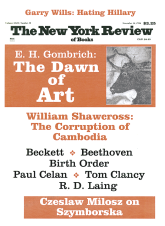1.
As each year—and each day—passes Cambodia seems more perplexing. The King, Norodom Sihanouk, has twice been crowned but now has little power; still, he maintains the aura of kingship and most Cambodians would feel that something terrible had happened if he abdicated or died. The country has two prime ministers running what amount to competitive administrations within one government. But one of them, Hun Sen, is much more powerful than the other, Sihanouk’s son, Prince Norodom Ranariddh, whose relations with his father are uneasy.
Now the two prime ministers have persuaded the rather reluctant King to give Ieng Sary, the former brother-in-law of Pol Pot, and a leader of the Khmer Rouge, perhaps the most murderous regime in modern history, a royal pardon. No questions asked.
Will Ieng Sary soon take some part in the double-headed government? That is what he is said to be discussing with both Hun Sen and Prince Ranariddh while he remains in a secret hideout near the Thai border, still in control of several hundred soldiers, about 20 percent of the Khmer Rouge fighting force, who have come with him. It may be months before we know the outcome. What is clear is that the new government that emerged in 1993 from the UN’s most ambitious peacekeeping effort has become mired in corruption, violence, and deception.
We can learn much about how it became so from the career, and the death last May, of Thun Bun Ly, a Cambodian newspaper publisher and editor who had been critical of the Royal Cambodian Government. Around 10:30 on the morning of Saturday, May 18, Thun Bun Ly left his house in Phnom Penh, and hailed a motorbike taxi. As the bike drove down Street 95, another motorbike carrying two men, one in uniform, sped by, and one of them fired a pistol at Thun Bun Ly. He was hit by two bullets in the chest and a third in his left arm. He fell to the ground and his driver fled.
This Issue
November 14, 1996





